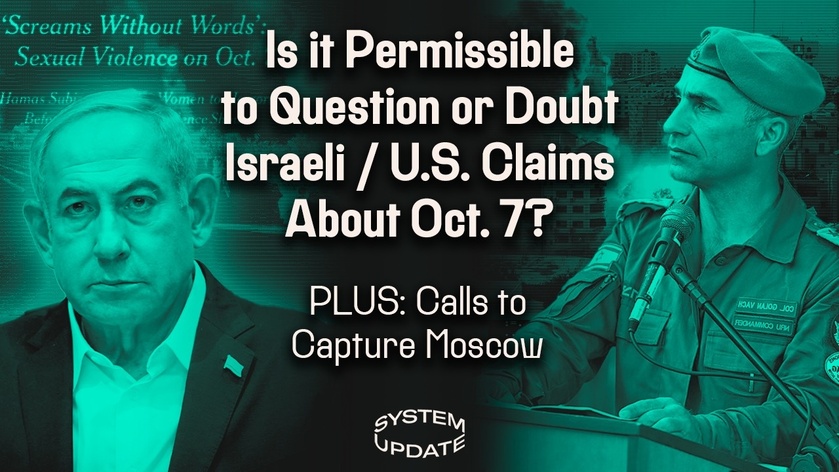Watch the full episode HERE
Good evening. It's Wednesday, June 12.
Tonight: There's no question that Hamas committed heinous and unjustified crimes against civilians inside Israel on October 7. The new U.N. report issued today confirms that happened along with Israeli war crimes since then. But there is also no question that among the most publicized and discussed atrocities once aggressively spread by the Israeli government, the U.S. government and the media of both countries there were a multitude of outright lies and fabrications about what happened on October 7. Those lies were deliberate and purposeful, and they did their job. They depicted October 7 as not just a common terrorist attack, but as some unprecedentedly barbaric and savage act worse than ISIS, we were told, and even worse than the 9/11 attack. The ultimate impact of those lies was to make Palestinians appear primitive, inhuman and even subhuman. “We are fighting animals,” said several Israeli officials in the weeks that followed.
Another impact – an intended one – of those lies was to convert October 7 into a sacred event, one whose core claims could never be questioned or investigated, let alone doubted or denied. For many weeks and even months, many of these now debunked lies continued to shape how Americans and others around the world perceived October 7 and Palestinians generally, as well as the Israeli destruction of Gaza that followed, which even extended to massively exaggerating the number of Israeli civilians killed on October 7 – as opposed to active duty soldiers and armed agents of the state that are considered legitimate military targets – to say nothing of the more melodramatic fabrications about how many of those people were killed. To this day, there are undoubtedly large numbers of Americans and Westerners who continue to believe that many of the key fabrications clearly and definitively debunked are, in fact, true.
The avalanche of lies that spewed forth about what happened on October 7 was, in an important sense, both familiar and yet unsurprising. As Americans, we have seen this playbook used over and over and over whenever a major event happens involving war or violence or some crisis, it is extremely common – one could even say inevitable – that the government will purposely issue all kinds of falsehoods in those key moments and days and weeks following that event. They do that because they know that those falsehoods will forever shape the public's emotional reaction, as well as the political perception of those events in a permanent way so that debunking those lies weeks or months later will have little to no effect in altering those fixed perceptions, one that was shaped by and is based in deliberate and official lies. The examples of how this has worked are far too numerous to comprehensively chronicle, so a few illustrative examples will have to suffice.
What makes the avalanche of horrific lies about October 7 particularly objectionable is that there were plenty of actual horrors and crimes that really did happen on October 7 inside Israel. Yet none of those suffice to achieve the propaganda goals and the war aims of the Israeli and American governments, namely, to create such a caricature, such a horror that would then allow Israel to destroy Gaza with unprecedented and indiscriminate violence aimed at its civilian infrastructure. Over the last several weeks, many events have made it virtually mandatory to take a hard, evidence-based journalist to look at just how many lies about October 7 the world was deliberately subjected to, and how many of those are still believed.
Then, a discussion featured on Bari Weiss's podcast earlier this week that we intended to cover last night but ran out of time, provides an extremely disturbing window into the mind of many Americans when it comes to war, the risk of nuclear weapons, and all sorts of delusions of American power. As we said, it featured a lengthy discussion of how easy it would be for the United States to engineer a coup inside Russia that would overthrow Vladimir Putin and then enable our forces to take Moscow. During the Cold War, concerns over a direct U.S.-Russia war were central – for decades – to U.S. foreign policy. And ever since Russiagate hysteria over Moscow has caused so many American policy and media elites to find the prospect of nuclear war either impossible or even laughable. Few things illustrate the widespread dangers of this thought about Russia like this conversation, so, we will take a look at relevant parts.
For now, welcome to a new episode of System Update, starting right now.






















